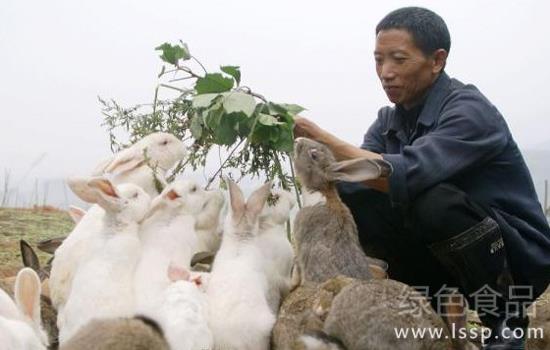Nutrition without side effects to prevent rabbit herd diseases with grass substitute medicine

Raising rabbits
Rabbits are herbivores, and many of the herbs they feed on are actually Chinese herbs, which not only have nutrition, but also can prevent and treat diseases. Long-term use does not produce resistance and no side effects. It can be used on the spot according to the season and the health status of rabbits.
Dandelion, also known as Huanghua Diding, mother-in-law Ding, with heat-clearing and detoxification, detumescence, cholagogic, antibacterial and anti-inflammatory effect. It can prevent and cure rabbit enteritis, diarrhea, pneumonia and mastitis.
Flat storage, also known as flat sprouts, bamboo and apple vegetables, has antibacterial, anti-dysentery and deworming effects. It has obvious killing or inhibitory effect on Staphylococcus aureus, Shigella, Escherichia coli and coccidia.
Purple flower is also known as Dingcao. Mouse cloth bag, with heat-clearing and detoxification, detoxification, detumescence, antibacterial and anti-inflammatory effect. Treat rabbit influenza, laryngitis, pneumonia, mastitis, enteritis, diarrhea and so on.
Law grass, also known as pulling seedlings, cutting and pulling vines, has the effects of heat-clearing and detoxification, diuresis, antidiarrheal, stomach-strengthening and bacteriostatic. To treat Escherichia coli, Clostridium welchii enteritis and intestinal infection in rabbits.
Plantain, also known as plantain and plantain, has the effects of diuresis, antidiarrheal vision and expectorant, and is used to prevent and treat respiratory tract, intestinal tract and coccidiosis infection.
Portulaca oleracea, also known as longevity dish, has the effect of clearing away heat and detoxification, dispersing blood and detumescence, stopping dysentery and hemostasis, repelling insects and eliminating chancre. Purslane is a favorite ingredient for rabbits. Feeding rabbits in Meiyu season can prevent diarrhea and coccidiosis in rabbits.
Artemisia argyi, also known as Artemisia argyi and Artemisia argyi, has the effects of hemostasis, calming the fetus, dispelling cold and dehumidification. Prevention and treatment of hematochezia, hematuria, fetal movement and eczema in rabbits.
Artemisia annua, also known as Artemisia annua, Artemisia seed, etc., has the effects of clearing heat and detoxification, fragrance and invigorating stomach, clearing liver and eyesight, relieving gallbladder, stopping dysentery, expelling phlegm and retreating malaria. Treatment of rabbit influenza, pneumonia, dysentery and malaria.
Artemisia annua L., also known as Artemisia annua L., has the effect of sweating and diuretic, cholagogic and jaundice. Treatment of rabbit liver coccidiosis, poor defecation, yellow, red and short astringent urine. Artemisia annua L. is a high-quality green feeding of rabbits, which is used to feed rabbits in spring, which can make young rabbits grow and develop fast, have a shiny coat and have a good body condition.
Wild chrysanthemum, also known as wild chrysanthemum, has the effect of dispelling wind, reducing fire and detoxifying. Treatment of diseases caused by Staphylococcus aureus, Streptococcus and Pasteurella multocida.
Honeysuckle, also known as honeysuckle, Shuanhua (planting), has the effect of clearing away heat and detoxification. Mainly treats rabbit influenza, pneumonia, respiratory and digestive tract diseases and other febrile diseases.
Folium Isatidis and Radix Isatidis (planted) have the effects of clearing distemper and detoxification, antibacterial and anti-inflammatory. It mainly treats rabbit pharyngitis, tracheitis, pneumonia, enteritis and so on.
Garlic (planting) has the functions of sterilizing, invigorating the stomach, relieving dysentery, relieving cough and deworming, and can treat many diseases such as enteritis, diarrhea, indigestion, influenza, pneumonia, coccidiosis and so on.
In addition to the above, there are Cnidium, Fructus Rehmanniae, motherwort, Pulsatilla, Patrinia, Houttuynia cordata, iron amaranth, cactus, locust flower, perilla, leek, ginger, scallions, watermelon peel, orange peel and so on. The above Chinese herbal medicines are widely distributed, rich in resources, readily available in rural areas, and have the characteristics of simplicity, easy to learn and good curative effect, so they are very suitable for raising rabbits in rural families.
- Prev

Pigs with seasoning grow fast
Pigs have a developed sense of taste, and there are more than 15000 taste cells in the oral cavity. Adding seasoning (seasoning) to the feed can promote the secretion of salivary glands, gastric glands and pancreas, increase food intake and promote growth and development. At present, there are several kinds of seasonings that are widely used. Sweet seasoning added 0.05 grams of saccharin to the diet of fattening pigs per kilogram could increase the daily gain of pigs by 6.4% and reduce feed consumption by about 5%. Adding a certain amount of saccharin to the diet of lactating sows can prevent sows from feeding.
- Next

Nutritional requirements of sheep
1. Nutrition needs goats, like other livestock, need all kinds of nutrients in their life activities, including protein, carbohydrates, fats, vitamins, minerals and water. The main results are as follows: (1) protein is a kind of nitrogenous compound, its basic composition is amino acid, there are many kinds of amino acid, but there are only more than 20 kinds of protein. Protein is the main component of sheep tissue and cell, and it is necessary to maintain the normal metabolism, growth, reproduction and production of various products. By
Related
- On the eggshell is a badge full of pride. British Poultry Egg Market and Consumer observation
- British study: 72% of Britons are willing to buy native eggs raised by insects
- Guidelines for friendly egg production revised the increase of space in chicken sheds can not be forced to change feathers and lay eggs.
- Risk of delay in customs clearance Australia suspends lobster exports to China
- Pig semen-the Vector of virus Transmission (4)
- Pig semen-the Vector of virus Transmission (3)
- Five common causes of difficult control of classical swine fever in clinic and their countermeasures
- Foot-and-mouth disease is the most effective way to prevent it!
- PED is the number one killer of piglets and has to be guarded against in autumn and winter.
- What is "yellow fat pig"? Have you ever heard the pig collector talk about "yellow fat pig"?

